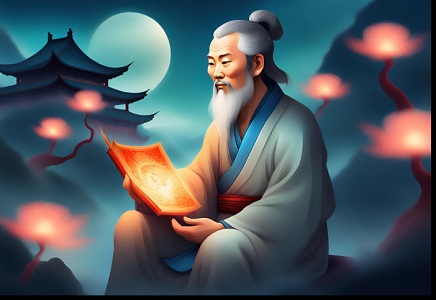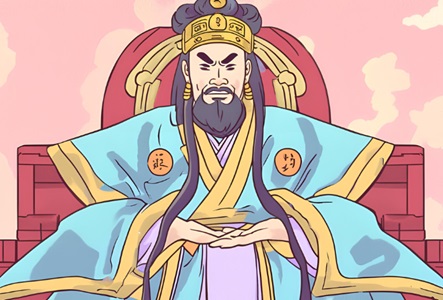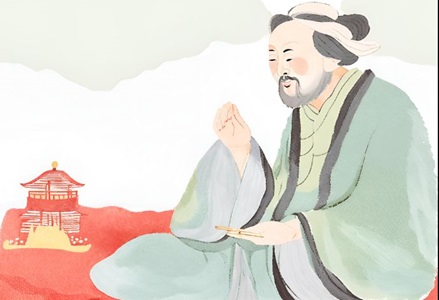Title of Biography in Chinese, Pinyin: 皋陶传 (Gāo Yáo Zhuàn).
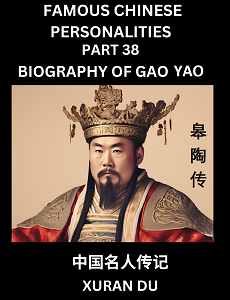
Title of Biography in English: The Biography of Gao Yao.
Check out books on my Amazon and Barnes & Noble homepages as well as the following pages to learn Biographies of famous Chinese personalities-
- Part 1 – Chinese Biography Book Series for Beginners
- Part 2 – Chinese Biography Book Series for Beginners
- Part 3 – Chinese Biography Book Series for Beginners
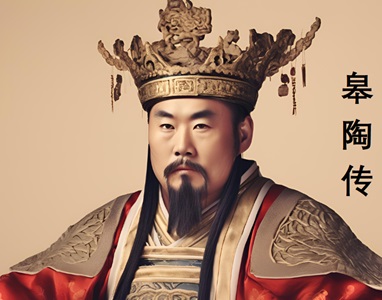
The Biography of Gao Yao in English (英文传记)
Biography of Gao Yao
Gao Yao, a renowned politician and judge from the Xia Dynasty, was famous for his justice, fairness, and keen insight in judicial matters. Born in the early years of the Xia Dynasty, he was intelligent and eager to learn, developing a profound interest in law and politics. During the reign of Yu the Great, Gao Yao was appointed as a judicial official due to his outstanding talent and profound knowledge.

In his judicial practice, Gāo Yáo always upheld the principles of justice and fairness, relying on facts and laws as the criteria for adjudicating cases. He was adept at reading people’s hearts and accurately grasping the essence and truth of cases, earning him the reputation of being “insightful and perceptive.” Under his governance, social order was well-maintained, and the people lived and worked in peace and contentment, making outstanding contributions to the stability and development of the Xia Dynasty.
Apart from his judicial talents, Gāo Yáo was also an outstanding politician. He was concerned about the people’s livelihood and advocated a series of policies beneficial to the country and its citizens. He emphasized the importance of governing the country with morality and etiquette, believing that only through moral education and etiquette norms could true social harmony and stability be achieved. These views were widely recognized and supported at that time.
However, Gāo Yáo’s life was not without challenges. He offended some powerful officials and traitors due to his adherence to justice and fairness, and was repeatedly framed and excluded. But he always adhered to his beliefs and principles, undeterred by power and authority, ultimately earning the respect and admiration of the people.

The life of Gāo Yáo is filled with legendary color. With his outstanding political talent and selfless judicial spirit, he made outstanding contributions to the stability and development of the Xia Dynasty. His deeds and spirit are forever inscribed in the long history, becoming a model for later generations to learn from and admire.
Learn Biography Of Gao Yao in Chinese (中文传记)
皋陶,夏朝时期著名的政治家和法官,以其公正无私、明察秋毫的司法才能而闻名。他出生于夏朝初期,自幼聪明好学,对法律和政治有着浓厚的兴趣。在夏禹时代,皋陶凭借其卓越的才能和深厚的学识,被任命为司法官员,负责审理案件、维护社会公正。

皋陶在司法实践中,始终秉持公正无私的原则,以事实为依据,以法律为准绳,不偏不倚地审理每一起案件。他善于洞察人心,能够准确地把握案件的本质和真相,因此被誉为“明察秋毫”的法官。在他的治理下,社会秩序井然,人民安居乐业,为夏朝的稳定和发展做出了杰出的贡献。
除了司法才能外,皋陶还是一位卓越的政治家。他关注民生,关心百姓疾苦,提出了一系列有益于国家和人民的政策。他主张以德治国,强调礼治的重要性,认为只有通过道德教育和礼仪规范,才能真正实现社会的和谐与稳定。这些主张在当时得到了广泛的认可和支持。
然而,皋陶的一生并非一帆风顺。他因为坚持正义和公正,得罪了一些权贵和奸臣,多次遭到陷害和排挤。但他始终坚守自己的信仰和原则,不为权势所动摇,最终赢得了人民的尊敬和爱戴。
皋陶的一生,是充满传奇色彩的一生。他以其卓越的政治才能和无私的司法精神,为夏朝的稳定和发展做出了杰出的贡献。他的事迹和精神,永远铭刻在历史的长河中,成为后人学习和敬仰的楷模。
Gao Yao Biography Keywords- English, Chinese & Pinyin (关键词)

- 皋陶 (Gāo Yáo): Gāo Yáo, a renowned politician and judge from the Xia Dynasty
- 公正无私 (Gōng Zhèng Wú Sī): Just and Selfless
- 明察秋毫 (Míng Chá Qiū Háo): Insightful and Perceptive
- 以德治国 (Yǐ Dé Zhì Guó): Governing the Country with Morality
- 礼治 (Lǐ Zhì): Rule of Etiquette
Pinyin of Gao Yao Biography (皋陶传记的拼音)
Gāo yáo, xià cháo shíqí zhùmíng de zhèngzhì jiā hé fǎguān, yǐ qí gōngzhèng wúsī, míngcháqiūháo de sīfǎ cáinéng ér wénmíng. Tā chūshēng yú xià cháo chūqí, zì yòu cōngmíng hàoxué, duì fǎlǜ hé zhèngzhì yǒuzhe nónghòu de xìngqù. Zài xià yǔ shídài, gāo yáo píngjiè qí zhuóyuè de cáinéng hé shēnhòu de xuéshì, bèi rènmìng wèi sīfǎguānyuán, fùzé shěnlǐ ànjiàn, wéihù shèhuì gōngzhèng.

Gāo yáo zài sīfǎ shíjiàn zhōng, shǐzhōng bǐngchí gōngzhèng wúsī de yuánzé, yǐ shìshí wèi yījù, yǐ fǎlǜ wéi zhǔnshéng, bùpiān bù yǐ dì shěnlǐ měi yīqǐ ànjiàn. Tā shànyú dòngchá rénxīn, nénggòu zhǔnquè de bǎwò ànjiàn de běnzhí hé zhēnxiàng, yīncǐ bèi yù wèi “míngcháqiūháo” de fǎ guān. Zài tā de zhìlǐ xià, shèhuì zhìxù jǐngrán, rénmín ānjūlèyè, wèi xià cháo de wěndìng hé fāzhǎn zuò chūle jiéchū de gòngxiàn.
Chúle sīfǎ cáinéng wài, gāo yáo háishì yī wèi zhuóyuè de zhèngzhì jiā. Tā guānzhù mínshēng, guānxīn bǎixìng jíkǔ, tíchūle yī xìliè yǒuyì yú guójiā hé rénmín de zhèngcè. Tā zhǔzhāng yǐ dé zhìguó, qiángdiào lǐzhì de zhòngyào xìng, rènwéi zhǐyǒu tōngguò dàodé jiàoyù hé lǐyí guīfàn, cáinéng zhēnzhèng shíxiàn shèhuì de héxié yǔ wěndìng. Zhèxiē zhǔzhāng zài dāngshí dédàole guǎngfàn de rènkě hé zhīchí.
Rán’ér, gāo yáo de yīshēng bìngfēi yīfānfēngshùn. Tā yīnwèi jiānchí zhèngyì hé gōngzhèng, dézuìle yīxiē quánguì hé jiānchén, duō cì zāo dào xiànhài hé páijǐ. Dàn tā shǐzhōng jiānshǒu zìjǐ de xìnyǎng hé yuánzé, bù wéi quánshì suǒ dòngyáo, zuìzhōng yíngdéle rénmín de zūnjìng hé àidài.

Gāo yáo de yīshēng, shì chōngmǎn chuánqí sècǎi de yīshēng. Tā yǐ qí zhuóyuè de zhèngzhì cáinéng hé wúsī de sīfǎ jīngshén, wèi xià cháo de wěndìng hé fāzhǎn zuò chūle jiéchū de gòngxiàn. Tā de shìjì hé jīngshén, yǒngyuǎn míngkè zài lìshǐ de chánghé zhōng, chéngwéi hòu rén xuéxí hé jìngyǎng de kǎimó.
